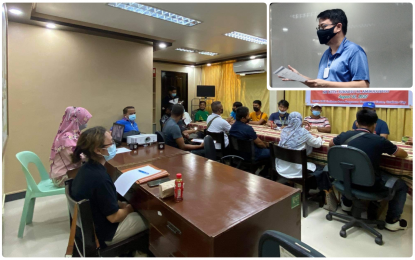
EMBARKING ON NEW CROPS. Farming group leaders in three upland towns in Maguindanao - South Upi, North Upi, and Datu Odin Sinsuat - listen intently as BBOI Chairman Ishak Mastura (inset) briefed them to try on new crops, particularly Cavendish banana, to enhance their income amid the pandemic, during a meeting on Wednesday (Sept. 1, 2021). The farmers, in return, agreed to try the Cavendish banana plantation technology in their respective areas. (Photo courtesy of BBOI-BARMM)
COTABATO CITY – A lawmaker called on farmers in the upland areas of the Bangsamoro Autonomous Region in Mindanao (BARMM) to try planting new crop varieties, including bananas, to improve their earnings amid the pandemic.
Starting in Maguindanao province, Bangsamoro Transition Authority – BARMM Member of Parliament (MP) Suharto M. Ambolodto, in collaboration with the regional Bangsamoro Board of Investments (BBOI), said Thursday they have gathered over a dozen upland farming group leaders in the area to present new business opportunities to boost the farmers’ income.
“This initiative aims to look for fair and inclusive investment opportunities to all farmers regardless of religion, groups, or tribes in the region,” Ambolodto said.
He said farmer leaders, mostly from Teduray farming communities in the tri-municipalities of South Upi, North Upi, and Datu Odin Sinsuat, all in Maguindanao, attended the forum held Wednesday here.
BBOI Board of Governor Mohammad Pasigan said their targets this time are farmers residing in the uplands of the region, to guide them in finding markets for their crops.
“We would also link them on the programs and services of both government and non-government agencies to decide on either to start-up their new farm investments or to level-up their routine farming crops to generate more income,” he said in a statement.
Highland farmers in Maguindanao rely mainly on corn, upland rice, and vegetable plantations as well as fruit-bearing plants including durian, coffee, and coconuts.
Meanwhile, Felino V. Samar, executive secretary of the Ministry of Indigenous Peoples Affairs (MIPA), expressed gratitude to the conveners for providing the forum for the highland farmers.
In a separate statement, he encouraged the farmers to plant Cardava bananas aside for their routine crops in the farmlands.
“Cardava banana might give us the opportunity to increase our farm yield and income since we learned that it is a lifetime investment with a low maintenance cost,” Samar said.
Farming group leaders Manuel Lalison of Barangay Labungan, Datu Odin Sinsuat; and Guiamel Campong of North Upi, also encouraged their fellow farmers to avail of the opportunities to shift their current low-producing farmlands into promising technology of Cardava banana plantation.
"We tilled our farmlands for so long now in our traditional ways of cropping but our income remains less progressive,” Lalison said.
To address this, BBOI Chairman Ishak Mastura has reiterated their full cooperation with Ambolodto as a partner in sharing the investment opportunities in the localities to meet regional economic growth and development.
On August 21, the BBOI inked a memorandum of agreement (MOA) in the BARMM’s Special Geographic Area (SGA) in North Cotabato for the setting up of a model banana farm plantation in the area.
Local investors who signed the MOA were Engr. Kaiser Usman of Usman Banana Plantation in Matanog, Maguindanao and Datu Jabib Guibar of Kabacan, North Cotabato.
The SGA comprises 63 villages in six towns of North Cotabato that opted to join the fledgling BARMM during a two-part plebiscite held in January and February 2019.
In April this year, the BBOI also approved the registration of the Al Muzafar Agriventure Inc. (AMAVI) that would pour in PHP950 million worth of investments in the region’s banana industry.
The AMAVI investment is expected to generate an annual production of two million to 3.3 million boxes of Cavendish bananas for export to Japan, China, and the Middle East.
Mastura added that the Harnessing Agribusiness opportunities through Robust and Vibrant Entrepreneurship Supportive of Peaceful Transformation (HARVEST) Program of Japan International Cooperation Agency, in partnership with Land Bank of the Philippines (LBP), is providing capital loan assistance to farm and business ventures at a very low interest rate in BARMM.
HARVEST Program is a five-year lending facility that will give private enterprises access to a credit line with LBP for their capital investments, operations, expansion initiatives, and agriculture-related projects that support agri-economic activities in the region. (PNA)
